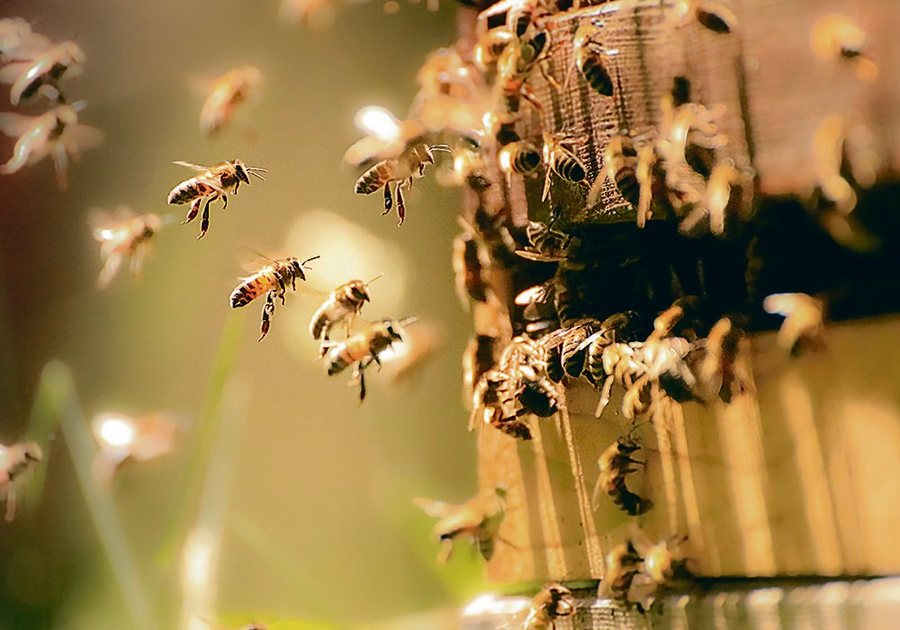"Superfood" for bees discovered - Increases birth rate, expected to end alarming population decline

A study led by the University of Oxford has developed a modified food supplement that could help prevent the alarming decline in bee populations around the globe.
The supplement, designed to mimic essential components found in plant pollen, significantly improves colony reproduction, according to findings published in the scientific journal, Nature.
Bees, which play a critical role in pollinating over 70% of crops globally, face increasing threats from climate change and agricultural intensification, which have significantly reduced flower acreage. Insects and pathogens have also had a negative impact.
Pollen, a key component of bee food, provides specific lipids called sterols, which are vital for bee development, but commercial pollen substitutes often lack these nutrients. The key point is that the new pollen substitute is not just a sugar, which beekeepers currently use during the winter season; the new superfood contains all the nutrients needed to create healthy offspring. The study’s lead author, Professor Geraldine Wright, from the Department of Biology at the University of Oxford, calls it “a complete food for bees.”
"We started to realize that there were gaps in the year when bees didn't have enough food available, and that was becoming increasingly important because crop pollination depended on bees. But also climate change affects when plants flower. And so sometimes we have these very long periods where there's not enough food for bee populations."
This produces malnutrition in that population and as a result we lose many colonies, also due to diseases. So, the article that was just published describes an invention, which will now make it possible to have complete food for bees. So, a food that contains all the macroelements and microelements that they need.
The Oxford team, which led the study, in collaboration with other institutions, engineered the yeast called "Yarrowia Lipolytica" to produce six key sterols identified in bee tissues.
"Using this yeast to produce sterols means we can produce a pollen substitute that can feed bee colonies indefinitely. And that's a really big advance for beekeepers, because historically they haven't had that tool available to them. The economics of livestock production have not really been focused on insects, or in terms of nutritional needs. So we think this is a big change in this field, which is expanding and growing in parallel with the growth of the human population."
During three-month trials in controlled greenhouses, colonies fed the sterol-enriched supplement grew up to 15 times more larvae than those fed standard diets. These colonies also maintained bee production for longer.
"It was my lab and my collaborators' lab at the University of Jerusalem in Israel that developed this pollen substitute. We've been working on it for over 15 years. We based it on testing thousands of different recipes for this pollen substitute, and we based it on testing many different sources of sterols. We realized that all the natural sources that we could put into a pollen substitute just didn't have enough sterol to make it a viable candidate. And that's why we decided to develop yeast to produce the sterol."
With the potential to reduce competition for wild pollen, the researchers hope the innovation could strengthen bee resilience and support global food security. Field trials are now planned to confirm the long-term benefits. Belgian company Apix Biosciences is collaborating with the Oxford team to begin commercial production of the food in 2026.
The Oxford University professor also says the aim is to make this pollen substitute affordable for beekeepers. "The pollen substitute will be more expensive than what is currently on the market. But it is the perfect food. So we predict that it will be better for bees in the long term, and therefore beekeepers will have to use less food to help their colonies ," says Wright.
When bees are well-fed, they are able to perform at their best against diseases, pathogens and insects, according to the study. The new study is thought to be a cornerstone in addressing the decline in bee numbers in recent decades.
The technology developed in the lab makes it possible to create a food that doesn't rely on flower pollen. There are currently other pollen substitutes on the market, but they are not complete and only provide bees with some of the nutrients they need, not all. With bee populations under threat around the world, Wright believes this new superfood could be a crucial weapon in halting the decline.

Rama: Vjosa, officially part of the UNESCO World Heritage List!
Prime Minister Edi Rama today published the decision announced during the World Congress on Biosphere Reserves in China, where the Vjosa River was officially......

"Save money for times of crisis" - ECB: Families should keep cash at home for emergencies
The European Central Bank (ECB) has stressed the importance of cash as a tool for national crisis preparedness, urging households to keep cash at home for......

Switzerland, the second richest country in the world - With a per capita income of around 270,000 euros, it ranks behind the USA
The global population grew richer in 2024, while Switzerland remained the second richest country in the world in terms of net wealth per capita. According to......

Constructions with public funds under "magnifying glass" - Muçaj: Be exemplary entities, they will be penalized for development permits
The State Labor Inspectorate has focused on the construction sector, launching an in-depth inspection campaign in all projects financed with public funds.......

Around 112 thousand new insurance contracts in 2025 - AFSA: The insurance market also increases its performance in premiums collected
Although at a slow pace or with occasional fluctuations, a greater insurance culture is being cultivated among Albanians from year to year. This is......

Energy losses in the network will be reduced below 12% - Government objective for the 4-year period: We rely on new measurement technologies
The government aims to reduce energy losses in distribution to less than 12% within 4 years. The government program 2025-2029 states that this result will be......

Greece, 1 billion euro increase in household deposits - Gross wealth per capita estimated at 33,190 euros for 2024
Monthly net flows in August into Greek households' deposit accounts with banks are estimated at 1 billion euros, with their balance standing at 151.3 billion......

Britain, mandatory digital IDs for employees - Government measure aims to curb illegal immigration
The British government has announced that every employee will have to have a mandatory digital identity document, as part of Prime Minister Keir Starmer's......

















